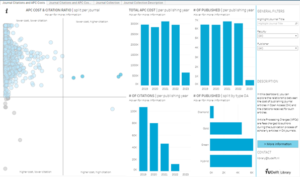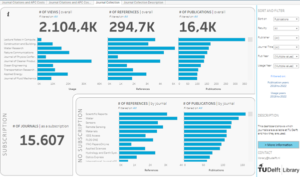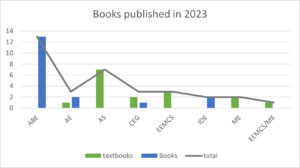As TU Delft OPEN Publishing, we are on a mission: create a community-driven and open access (OA) scholarly communication platform that provides resilient publishing services to the dynamic community of teachers and researchers at TU Delft. Now that we are four years in existence, we are proud to look back on what we achieved and look forward to working with many more scholars across all faculties and supporting them in their journey to bring their research to the world!
Portfolio
Books
Our book collection contains textbooks, conference books, monographs and edited volumes. In late 2022, Delft Academic Press (DAP) ended its longstanding activities of publishing and distributing physical teaching materials, causing significant disruptions for lecturers at the TU Delft. We, therefore, acquired 20 textbooks published by DAP and gradually proceeded to publish all the titles we have publishing rights for as open textbooks throughout 2023.
In 2023, we published 34 books, including 12 classical textbooks, four interactive textbooks, and three conference books. Four textbooks resulted from a collaboration with other universities and six monographs and edited volumes were co-published in partnership with other publishers. We started a partnership with Mkuki na Nyota publishers from Tanzania, where we co-published Things Don’t Really Exist Until You Give Them a Name: Unpacking Urban Heritage
We introduced an “Education Series,” where our authors address themes they encounter in their teaching activities at the TU Delft. These include aspects such as the role of collaboration in learning, multidisciplinary approaches to education (and research), the need for a broader skill set beyond technical knowledge, more holistic roles for engineers, emphasising social responsibility, innovation, and sustainability, and the integration of societal values, and the critical examination thereof, into university education. More
Journals
Across all our OA journals, we published 189 articles in 2023. TU Delft OPEN Publishing publishes fourteen and hosts three OA journals in 2023.
The Journal of Open Aviation Science, Junzi Sun (co-editor in Chief, Faculty AE-TU Delft) and Xavier Olive (co-editor in Chief, ONERA, France) published its first articles and conference proceedings.
The Journal of Coastal and Riverine Flood Risk, Jeremy Bricker (co-editor in Chief, University of Michigan), Bas Jonkman (co-editor in Chief, Faculty CEG-TU Delft), Grit Martinez (co-editor in Chief, Ecologic Institute, Germany) and Miguel Esteban (co-editor in Chief, Waseda University, Japan)- published its first articles and its first special issue.
Improved publishing services
Here are the latest enhancements we have made to meet the needs of our community better.Crossref: In 2023, we became a member of Crossref and began rating our Datacite DOIs to Crossref. This process will continue in 2024. Crossref will increase the visibility and discoverability of our publications and consequently increase the recognition of our authors and editors.
Biorender: In 2021, TU Delft started a two-year pilot with Biorender. BioRender allows researchers to create professional figures in minutes through the use of pre-made icons and templates. This allows researchers to promote and communicate their research more effectively and create figures much more efficiently. BioRender is much easier to use compared to other illustrator programmes and has integrations with, for example, the Protein Data Bank, which allows the import of structures. Based on requests for BioRender licenses from researchers from three faculties (AS, 3mE and EWI), it was explored whether it was possible to offer these licences. A proposal was discussed with the Library Management Team in July 2020. In 2023, the pilot was prolonged as a steady service for researchers. By the end of 2023, the seats had been expanded to 200.
Indexing: Our books, including master-level textbooks, are indexed in Scopus.
Co-creation: We started a partnership with Jap Sam Books, independent publishing in architecture, art, philosophy, design, and photography, which includes journals and books. The first publications are expected in 2024.
Software Upgrades: There have been five upgrades to the software used for the journals and books platforms. These upgrades aimed to enhance functionality, improve user experience, fix bugs, and introduce new features.
Themes with TU Delft Brand: Five themes have been created for the book platforms and two for the journal platform. These themes (javascript, CSS) include design elements such as positioning of text, colour schemes, typography, and layout styles representing the TU Delft brand identity.
Open Science Initiatives
We organised two events: the codecheck hackathon as part of the peer-review of data and software pilot and a panel discussion on peer review. We started piloting the use of ChatGPT to assist the Journal of Aviation Science in the copyediting stage. To increase the visibility of our authors and editor, we have introduced the Authors/Editors spotlights that are published on our blog. We integrated Publons (Reviewer Locator & Reviewers Recognition) with our Open Journals System (OJS) in order to monitor journal engagement with reviewers. As the pilot concludes, we are conducting UX interviews with editors, authors, and reviewers to evaluate the impact of both tools on the publishing process and peer-review practices.
Peer Review innovations: peer-review of data and software pilot The pilot project on peer reviewing datasets and software, a collaboration between TU Delft OPEN Publishing and Research Data and Software teams, is experimenting with innovative open peer review processes that consider data and software as independent research outputs. It aims to make the methodology of data and software production more open and transparent, optimising reuse of data, enhancing reproducibility and promoting principles of Open Science. The pilot has 3 phases. Phase one of the pilot focused on a) engaging people and communities interested in data, software, open publishing and open science, b) seeking collaborations through events, c) writing a guideline and idea for implementation, and d) testing the peer review guidelines. Phase 1 (c,d) Phases 2 and 3, which will focus on sustainable integration of data/software reviews into publication workflows and additional policy documentation of the project recommendations, will be deployed after 2024 Q1. Check the final report here. Communication and Engagement with Researchers and Teachers Our communication and engagement efforts with researchers and teachers centred on a comprehensive strategy. We organized a panel discussion on peer-review to get collaborative feedback, and we initiated Authors/Editors Spotlights, recognizing academic contributions to promote a sense of community. Exploring the integration of open scholarly publishing advocacy in faculties, we aim to offer guidance on open-access publishing, funding and policies. We are looking into expanding our outreach beyond academia through public engagement initiatives, including plain language summaries for publications and blog posts. Editorial Support In response to some of our researchers’ preferences, we enlisted a student proficient in Latex to assist with transforming publications/templates. Another student focused on creating a generic book template, streamlining the book creation process, and ensuring consistency and professionalism. Additionally, we are exploring the integration of AI for copyediting, and enhancing language and grammar checks to maintain high-quality outputs in our publications. Reviewer Recognition We succeeded in making one step forward in the recognition of the reviewer work of our first open identity review reports in our journal, The Evolving Scholar. The reviews are available immediately after submission, linked to the reviewed paper. These review reports are open for the transparency of the review process. This initiative aligns with our commitment to fostering a transparent and streamlined peer review system within our academic publishing framework. Mainstreaming Open Science Fund recipients. Connecting FAIR data with OA publications This pilot project started in March 2023 and led by two student assistants explore the practices of TUD researchers when it comes to mentioning, sharing, and citing their data in the publications. An assessment framework has been developed, and a community session has been carried out at the Open Science Festival on 31-08-2023; at the moment, a blog on the Open Science Festival session and a report on the findings of the project is close to completion. DelftX: Open Science-Sharing Your research to the world This Massive Open Online Course (MOOC) introduces Open Science principles, covers Open Data management, FAIR software practices, and citizen science engagement. Participants learned how to effectively enhance research visibility, manage data, and navigate Open Access publishing, with practical applications and discussions on implementing Open Science policies. Between 25 October-5 and December 2023, the MOOC focused on Open Access publishing. The course syllabus is available here. Open Access 98% of the peer-reviewed articles and 91% of the conference papers published by TU Delft in 2022 were open access respectively. The Executive Board approved in October 2023 the new Open Access policy and guidelines and instituted the Short Scientific work at TU Delft Scheme as part of TU Delft’s terms of employment. This policy, known as the Tavern Amendment, lets authors of publicly funded scientific works make their articles freely available after six months. This right overrides any publisher agreements, allowing authors to share their work in the university repository. As a library, we have experts who see concerns and trends both on a national and international level. If we want to be proactive instead of reactive, we feel it would be a positive first step to chart the publication cultures at the faculties of our university. Once we have a clear picture of the current situation, we’d suggest starting a broader discussion on what type of publication culture we want to have and what steps each faculty has to take to get there. Our taskforces are there to lend their expertise and as a link to the support of the library. To start, we want to make employees more aware of both their reading and publication habits. This dashboard shows journals and their number of views (read), references and publications from TU Delft authors. We became members of OASPA (Open Access Scholarly Publishing Association), a diverse community of organisations engaged in open scholarship. We hope that OASPA will be a unifying factor that supports all bona fide open access initiatives and thus act as a partner for us in the work we do. To increase the visibility of our authors and editor, we have introduced the Authors/Editors spotlights that are published on our blog. The blog launched in 2021 aims to share innovative concepts, trigger discussion, and highlight our latest developments and progress. This blog endorses openness, fairness, and diversity. In 2023, we produced 14 Blogs, including four Editor/author spotlights. The Publication & Collection Taskforce, in collaboration with the Scholarly Communication & Publication team, has written a discussion paper on the publication culture at TU Delft and our concerns. This has been discussed with the deans of all faculties by Irene Haslinger (director of the TU Delft Library) and Anke Versteeg (Policy & Relations Coordinator). It has been well received, and the next steps are being formulated. We added two new members to the team: a Publishing Operations Officer and a Publishing Operations Support. We also reorganised our team to serve our community better. https://www.tudelft.nl/library/actuele-themas/open-publishing/about/our-team Frédérique Belliard, Marion van den Berg, Ymke Bresser, Lynette Croxford, Joke Dales, Nikhil Dhage, Danny Greten, Frederik Hogenbosch, Monique IJzinga, Michiel de Jong, Afra Knaap, Gabriela Kuhn, Paschalis Kontanas, Just de Leeuwe, Jacqueline Michielen-van de Riet, Kees Moerman, Heather Montague, Nicoleta Nastase, Ardi Nonhebel, Louise Otting, Juliana Costa Pitanguy, Alenka Prinčič, Roberto Rabasco; Antonio Romero, Animesh Sahoo, Nienke van Schaverbeke, Yasemin Türkyilmaz-van der Velden, Anke Versteeg, Yan Wang, Emilie Yane-Lopes, Tanya Yankelevich. We would also like to thank all the editors, authors, and reviewers who contributed to our publications’ growth, development, and quality.Publications and Collection Taskforce
One of the taskforce aims is to start a discussion about our publication culture

Outreach
Membership
Aerospace Engineering-AE
Applied Sciences-AS
Architecture and the Built Environment -ABE
Civil Engineering and Geosciences-CEG
Industrial Design Engineering -IDE
Electrical Engineering, Mathematics & Computer Science-EEMCS
Mechanical, Maritime and Materials Engineering-ME
Technology, Policy and Management-TPM
Acknowledgement

